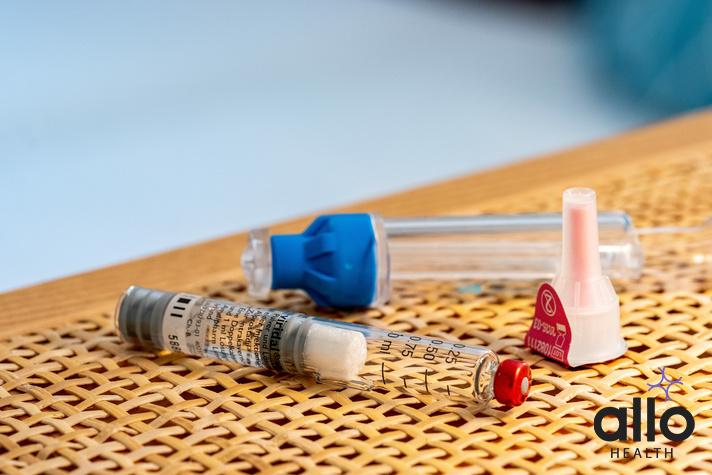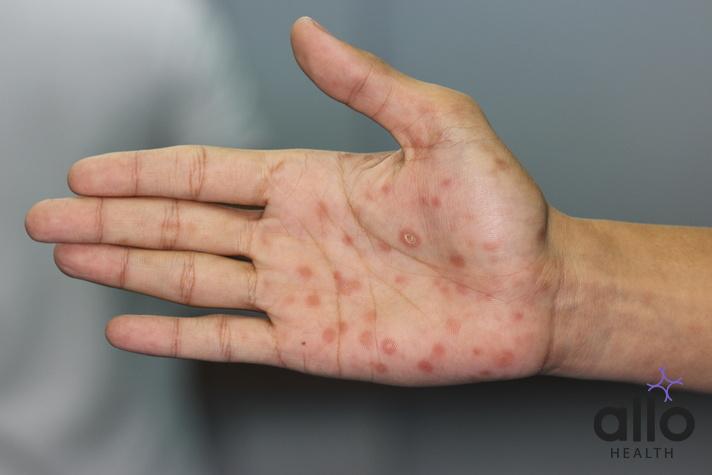What Are The Causes Of Syphilis?

Allo Health is dedicated to personalized well-being, offering support and trusted information tailored to individual health goals. The platform emphasizes human-generated content, led by a distinguished medical team of experts, including physicians and sexual health specialists. Their commitment to credibility involves rigorous fact-checking, authoritative research, and continuous updates to ensure accurate, up-to-date information. Allo Health's unique approach goes beyond conventional platforms, providing expert-led insights and a continuous commitment to excellence, with user feedback playing a crucial role in shaping the platform's authoritative voice.

Dr. Aditi completed her undergraduate medical education at AJIMS, Mangalore, after which she worked in multi-speciality hospitals with COVID patients and in the Pain and Palliative medicine department. Driven by her experiences, she developed a keen interest in psychiatry. Dr. Aditi believes that mental health is just as, if not more important, than physical health.
Why This Was Upated?
Our experts continually monitor the health and wellness space, and we update our articles when new information became available.
Updated on 02 May, 2024
- Article was updated as part of our commitment to diversity, equity, and inclusion.
"The following blog article provides general information and insights on various topics. However, it is important to note that the information presented is not intended as professional advice in any specific field or area. The content of this blog is for general educational and informational purposes only.
Book consultation
The content should not be interpreted as endorsement, recommendation, or guarantee of any product, service, or information mentioned. Readers are solely responsible for the decisions and actions they take based on the information provided in this blog. It is essential to exercise individual judgment, critical thinking, and personal responsibility when applying or implementing any information or suggestions discussed in the blog."
Syphilis is a sexually transmitted infection (STI) caused by the bacterium Treponema pallidum. It is a complex disease with various stages and symptoms, and its causes can be multifaceted. Understanding the causes of syphilis involves looking into its transmission, risk factors, and underlying biological mechanisms.
Transmission

Syphilis is primarily transmitted through sexual contact with an infected person. This includes vaginal, anal, and oral sex. The bacterium Treponema pallidum enters the body through mucous membranes or breaks in the skin. It can also be transmitted from an infected mother to her unborn child during pregnancy, known as congenital syphilis. Additionally, syphilis can be transmitted through blood transfusions or by sharing needles contaminated with infected blood, although these modes of transmission are less common.
Risk Factors
Several factors increase the risk of acquiring syphilis:
Unprotected Sexual Activity: Engaging in unprotected sex, especially with multiple partners or with partners whose infection status is unknown, increases the risk of syphilis transmission.
Men Who Have Sex with Men (MSM): MSM have a higher risk of syphilis infection compared to heterosexual individuals due to factors such as a higher prevalence of STIs within this population and an increased likelihood of engaging in risky sexual behaviors.
Substance Abuse: Injection drug use, particularly sharing needles and other drug paraphernalia, can lead to syphilis transmission if contaminated with infected blood.
HIV Infection: People living with HIV have an increased risk of acquiring syphilis due to a weakened immune system, which makes them more susceptible to infections.
Biological Mechanisms

Once Treponema pallidum enters the body, it undergoes a series of complex interactions that lead to the development of syphilis.
These mechanisms include:
Invasion of Tissues: The bacterium enters the bloodstream and lymphatic system, allowing it to spread throughout the body. It can invade various tissues, including the skin, mucous membranes, joints, bones, and internal organs.
Immune Response: The body’s immune system responds to the infection by producing antibodies against Treponema pallidum. However, the bacterium has evolved mechanisms to evade the immune system, allowing it to persist and cause chronic infection if left untreated.
Clinical Stages: Syphilis progresses through distinct stages if untreated. These stages include primary syphilis (characterized by the presence of a painless sore called a chancre at the site of infection), secondary syphilis (involving systemic symptoms such as rash, fever, and swollen lymph nodes), latent syphilis (asymptomatic stage with no visible symptoms), and tertiary syphilis (which can lead to severe complications such as neurosyphilis, cardiovascular syphilis, and gummatous syphilis).
Prevention
Preventing syphilis involves various strategies:
Safe Sex Practices: Using condoms correctly and consistently during sexual activity can reduce the risk of syphilis and other STIs.
Regular Screening: Routine screening for syphilis and other STIs is essential, especially for individuals at higher risk, such as sexually active individuals, MSM, and pregnant women.
Treatment of Infected Individuals: Prompt diagnosis and treatment of syphilis with antibiotics, typically penicillin, are crucial to prevent the progression of the disease and reduce transmission to others.
Pre-Exposure Prophylaxis (PrEP): For individuals at increased risk of acquiring HIV, PrEP can also indirectly reduce the risk of syphilis by lowering overall HIV transmission rates within high-risk populations.
Global Impact
Syphilis remains a global public health concern, with millions of new cases reported annually worldwide. Its impact extends beyond individual health, affecting sexual and reproductive health outcomes, maternal and child health, and healthcare costs. Efforts to combat syphilis include awareness campaigns, education on safe sex practices, promotion of regular screening, and ensuring access to affordable and effective treatment.
In conclusion, syphilis is caused by the bacterium Treponema pallidum and is primarily transmitted through sexual contact. Understanding the transmission modes, risk factors, and biological mechanisms of syphilis is essential for the prevention, early detection, and effective management of this STI. Public health strategies focusing on prevention, education, and access to healthcare services play a crucial role in addressing the challenges posed by syphilis on a global scale.
Most Asked Questions
-
Can Syphilis Be Prevented?
Yes, syphilis can be prevented through various measures: Safe Sex Practices: Using condoms correctly and consistently during sexual activity can significantly reduce the risk of syphilis transmission. Limiting Sexual Partners: Limiting the number of sexual partners and choosing partners who have been tested and are free from STIs can lower the risk. Regular STI Testing: Undergoing regular testing for syphilis and other STIs, especially if sexually active or at increased risk, allows for early detection and treatment. Avoiding Sharing Needles: If injecting drugs, avoiding sharing needles or other drug equipment can prevent syphilis transmission and other blood-borne infections. Screening and Treatment during Pregnancy: Pregnant women should undergo screening for syphilis early in pregnancy and receive timely treatment if infected to prevent transmission to the fetus.
-
What Are the Primary Causes of Syphilis?
The primary cause of syphilis is the bacterium Treponema pallidum. This bacterium enters the body through mucous membranes or breaks in the skin during sexual contact with an infected person. It can also be transmitted through blood transfusions, although this is rare in areas with stringent blood screening procedures.
-
Can Syphilis Be Spread Through Non-Sexual Contact?
While syphilis is primarily transmitted through sexual contact, it can also be transmitted non-sexually in rare cases. This can occur through direct contact with syphilitic sores (known as chancres) during sexual activity or other forms of skin-to-skin contact. However, non-sexual transmission is much less common compared to sexual transmission.
-
What Are the Risk Factors for Contracting Syphilis?
Several factors can increase the risk of contracting syphilis: Unprotected Sex: Engaging in sexual activity without using condoms or other barrier methods increases the risk of contracting syphilis. Multiple Sexual Partners: Having multiple sexual partners can increase the likelihood of coming into contact with an infected person. History of STIs: People who have had previous sexually transmitted infections are at a higher risk of contracting syphilis. Drug Use: Injecting drugs and sharing needles or other drug paraphernalia can increase the risk of syphilis transmission. Sexual Activity at a Young Age: Engaging in sexual activity at a young age can increase vulnerability to syphilis and other STIs. Having a Partner with Syphilis: Being in a sexual relationship with a person who has syphilis increases the risk of transmission.
-
What is Syphilis and How is it Transmitted?
Syphilis is a sexually transmitted infection (STI) caused by the bacterium Treponema pallidum. It can be transmitted through sexual contact with an infected person, including vaginal, anal, or oral sex. It can also be transmitted from a pregnant woman to her unborn child during pregnancy or childbirth, leading to congenital syphilis.









































